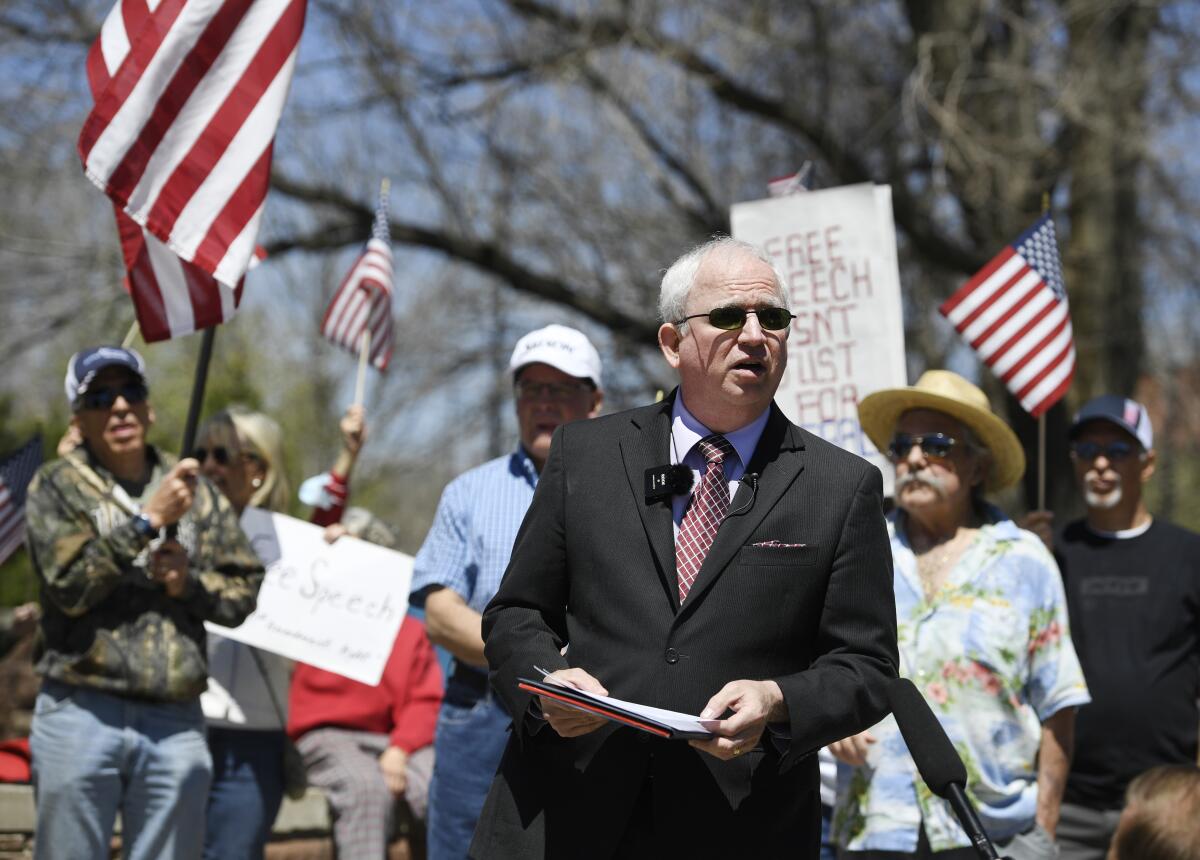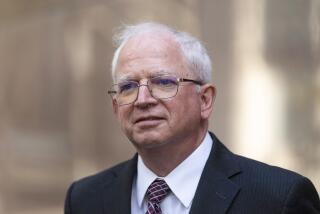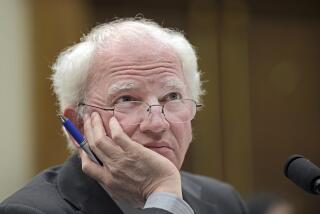Who is John Eastman? Hearing to show conservative California attorney’s role in Jan. 6 insurrection

- Share via
WASHINGTON — Donning a long, tan overcoat, paisley scarf and a brown cowboy hat, conservative attorney John Eastman stood on stage at the Save America rally just outside the White House to deliver a speech on Jan. 6, 2021, shortly before Congress began certifying the results of the 2020 presidential election.
“All we are demanding of Vice President [Mike] Pence is this afternoon at 1 o’ clock, he let the legislatures of the states look into this, so we get to the bottom of it, and the American people know whether we have control of the direction of our government or not!” Eastman yelled into a microphone.
For the record:
11:07 a.m. June 18, 2022An earlier version of this article said that John Eastman led the Claremont Institute. He is a senior fellow at the Claremont Institute.
Stretched before Eastman, a former Chapman University professor, were thousands of supporters of former President Trump. A few hours later, after Trump addressed them, the crowd stormed the Capitol and violently disrupted the count.
Eastman is one of many figures who played a key role in the “Stop the Steal” movement. His theory that Pence could reject state votes or delay the certification of the election made him the “central player in the development of a legal strategy to justify a coup,” according to House General Counsel Douglas Letter.
Thursday’s hearing by the House Select Committee investigating the Jan. 6, 2021, attack is expected to focus heavily on Eastman’s role.
Who is John Eastman?
Eastman, 62, was born in Lincoln, Neb., and holds a bachelor’s degree in politics and economics from the University of Dallas, a law degree from the University of Chicago Law School and a doctorate in government from the Claremont Graduate School in Claremont.
He clerked for Supreme Court Justice Clarence Thomas before his 21-year teaching career at Chapman University’s law school in Orange. Eastman is a senior fellow at the Claremont Institute, a right-wing think tank, and founded the Center for Constitutional Jurisprudence.
Chapman University asked him to resign after his Jan. 6, 2021, speech.
When did Eastman become acquainted with President Trump?
Both men have long opposed birthright citizenship, the process that grants automatic citizenship to any child born in the United States or a U.S. territory. In 2020, Eastman publicized an opinion piece questioning whether Vice President Kamala Harris, the child of two immigrants to the United States, met the presidential qualifications.
The weekend after the Nov. 3, 2020, election, Eastman was invited by people in Trump’s orbit to help craft a legal brief that challenged the election results in Pennsylvania.
In early December, Trump asked him to bring legal action challenging the election directly to the Supreme Court. Eastman made two filings to the court, but the effort quickly failed.
What is the Jan. 6 committee’s focus?
The committee is focusing on two legal memos Eastman wrote in which he advised Pence of two options for overturning the election results. According to the U.S. Constitution, the vice president is also the president of the Senate and must count the electoral college votes in the presence of the Senate and the House of Representatives. Eastman’s advice sought to interfere with this process in two ways.
The first option, Eastman advised, would be for Pence to declare the results in key battleground states in dispute, leaving the votes uncounted and turning the election in President Trump’s favor.
The second, more radical approach would require Pence to delay the certification of the electoral college count to give state lawmakers time to select a new slate of electors who would vote for President Trump. Not all states have laws that require electoral college representatives to vote with the majority of the people in the state.
Depositions released by the committee show that Eastman was part of several meetings with Pence’s staff, including a Jan. 4, 2021, Oval Office meeting with Trump and Pence to discuss what authority Pence had. Trump urged Pence to dismiss the electoral college votes for seven states. Eastman made the case that the most politically palatable option was for Pence to send electoral college votes back to the states, but that Pence could also opt to reject electors.
Emails released by the committee also show Eastman arguing with Pence’s staff during the riot about what the vice president should do when Congress returned to finish counting the votes.
“The ‘siege’ is because YOU and your boss did not do what was necessary to allow this to be aired in a public way, so that the American people can see for themselves what happened,” Eastman wrote in an email to Greg Jacob, Pence’s lawyer.
Once the riot at the Capitol ended, Eastman again emailed Jacob to say the vice president should refuse to certify the election and send it back to the states.
Wasn’t there another ruling by a judge involving Eastman?
Yes, on June 7, U.S. District Judge David O. Carter ordered Eastman to turn over an additional 159 documents, including one Carter said was evidence of a crime, to the Jan. 6 committee with a deadline of June 13. Included in these documents is a December 2020 email that Eastman wrote considering asking the courts to rule on the proper interpretation of the Electoral Count Act. Such a move would have risked a court finding that prevented Pence from rejecting the electoral college count, however.
“Because the attorney concluded that a negative court ruling would ‘tank the January 6 strategy,’ he encouraged the legal team to avoid the courts,” Carter wrote. “This email cemented the direction of the January 6 plan. The Trump legal team chose not to seek recourse in court — instead, they forged ahead with a political campaign to disrupt the electoral count.”
Did Eastman stop his efforts after Jan. 6, 2021?
No. Earlier this week the committee teased that Eastman’s efforts didn’t stop after the Capitol attack, releasing a clip from a deposition by former White House attorney Eric Herschmann, who discussed a phone call from Eastman the day after the riot. Herschmann remembered Eastman asking him about preserving documentation dealing with Georgia that could potentially be used in an appeal.
“And I said to him, ‘Are you out of your effing mind?’” Herschmann said. “I said, ‘I only want to hear two words coming out of your mouth from now on: ‘orderly transition.’”
Herschmann then pressed Eastman to repeat those two words back to him — Eastman eventually did.
“I said, ‘Good, John. Now I’m going to give you the best free legal advice you’re ever getting in your life: Get a great effing criminal defense lawyer. You’re going to need it,’” Herschmann said. “And then I hung up on him.”
More to Read
Get the L.A. Times Politics newsletter
Deeply reported insights into legislation, politics and policy from Sacramento, Washington and beyond. In your inbox three times per week.
You may occasionally receive promotional content from the Los Angeles Times.











